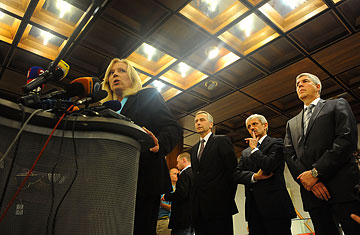
Slovakia Prime Minister Iveta Radicova (left) and political leaders give a press briefing after a parliamentary session on the eurozone's rescue fund on October 11, 2011 in Bratislava
In almost 19 years as an independent nation, Slovakia has never attracted world attention as it does now. But the Slovakian Parliament's vote late Tuesday to reject plans for the euro zone's bailout fund guarantees global headlines for the country at the heart of the European continent. And it means a new, Slovakia-sized headache for the leaders attempting to resolve the whirling debt crisis that threatens to engulf the euro zone.
With the other 16 euro-zone countries having already said 'yes' to the new measures, Slovakia's was the deciding vote. The result — just 55 of the 124 votes cast in Parliament backed the motion — did not come as a surprise: one of the four parties in the coalition government, the Freedom and Solidarity Party (SaS), was implacably opposed to the fund, with its leader Richard Sulik arguing that Slovakia is too poor to pay for the fiscal mistakes of debt-ridden nations like Greece. The vote also reflects the growing hostility Slovakians now feel towards the rest of Europe, in contrast to their enthusiasm upon joining the European Union in 2004, and becoming euro members in 2009.
Slovakia already underwent a gruelling overhaul of its centrally planned economy in the 1990s. Those reforms reaped benefits, with big name foreign companies setting up plants across the country. Slovakia has proven particularly adept at car-making, with VW, Porsche, Audi, Kia and Peugeot all moving in: dubbed the Detroit of Europe, the country now leads the world in cars produced per capita and earns about a quarter of its economic performance from the automobile industry.
But the downturn has changed fortunes and soured the mood in this country of just 5.5 million. The economy, which grew by more than 10% in 2007, shrank by almost 5% in 2009. Slovakia is still the second poorest country in the E.U., with purchasing power stuck at 74% of the E.U. average. Salaries average about €780 ($1,064) a month, only just above Greece's minimum wage of €750 ($1,023) — while the average Slovakia pension is just €300 ($409) per month, compared to €1,200 ($1,637) in Greece. Like Greece, Slovakia has seen its fair share of street protests, with teachers and doctors marching in Bratislava on successive days last week. But unlike Greece, Slovakia's own response to the economic slump has been painful, self-imposed reforms.
The deal that Slovakia shot down on Tuesday had been agreed at a summit last July and was designed to bolster the €440 billion ($590 billion) bailout fund, known as the European Financial Stability Facility (EFSF). A beefed-up EFSF with new firepower to recapitalize banks and bail out sovereigns at the same time is seen as essential to stabilizing the euro zone, but it also implies more costs for the contributing countries. In Slovakia's case, that means some €7.7 billion ($10.9 billion) for the euro-rescue fund, about 10% of GDP. Slovakia is by no means the only euro-zone member to resent bailing out countries like Greece, Ireland and Portugal — Germany had its own difficult vote last month — but it is probably the one that is hurting the most.
So what happens now? This is not the end of the story, and Slovakian Prime Minister Iveta Radičová said beforehand that the vote would be repeated until the bill is passed. That would mean reaching out to the opposition center-left Smer-Social Democracy party, which abstained in the vote but indicated it would be able to back the measure under certain conditions — namely snap elections. If Radičová accepts this deal, a repeat vote could be held within a few days. And since Radičová had tied the euro plan to a vote of confidence, her government has effectively collapsed anyway.
The vote is still a big if, and leaves the euro zone at the mercy of Slovakia's precarious domestic politics, which is why E.U. officials are already muttering about legal maneuvers to give Bratislava a right to opt out of participating in the new Greek package, and out of the EFSF altogether.
But Slovakia is just one piece in the euro jigsaw that seems to become more convoluted every day. While the new bailout rules need to be ratified, most market analysts now say the EFSF is already outdated, and needs to be quadrupled in volume. Speaking at a conference in Seoul on Tuesday, economist Nouriel Roubini talked of "a big bazooka of at least €2 trillion to avoid self fulfilling runs on illiquid but solvent countries."
Greece's troubles are far from solved: also on Tuesday, a mission of E.U. and International Monetary Fund inspectors noted that Athens would need more austerity measures to get it out of its debt hole as it has so far failed to convince the private sector, at home or abroad, that it is serious about modernizing the country.
But as outgoing European Central Bank President Jean-Claude Trichet said Tuesday, events are moving too fast for Europe's decision-makers. "The crisis is systemic and must be tackled decisively," he told a European Parliament committee. "The high interconnectedness in the E.U. financial system has led to a rapidly rising risk of significant contagion. It threatens financial stability in the E.U. as a whole and adversely impacts the real economy in Europe and beyond."
The interconnectedness he's referring to has briefly brought Slovakia into the equation. The euro could bypass the bump in Bratislava, but other obstacles lie in wait.
